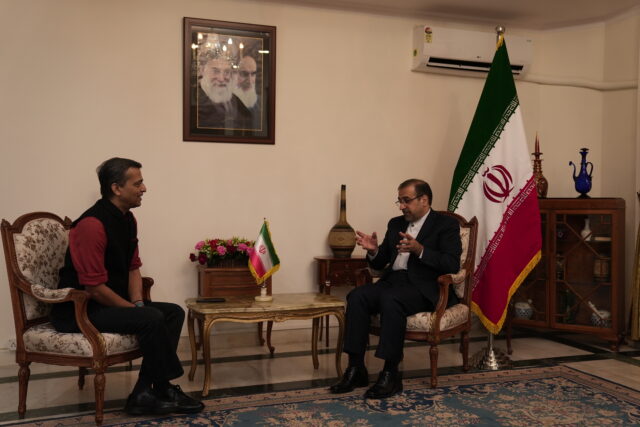India-Iran Chabahar Deal
Why is the 10-year Iran-India Chabahar port deal of significant importance? “Iran’s geographical position is important. Iran is at the crossroads of the north-south and east-west trade routes,” Tehran’s Envoy to India, Dr. Iraj Elahi tells StratNews Global in an interview. On Iran and India’s convergence of interests, he says, “India is a rising power, has a growing economy. India’s international trade has reached close to $2 trillion. And it means India needs to diversify its routes of international trade.” Dr. Elahi adds, “India tries to be part of supply chains (to get) access to different markets and raw material sources.” The mutual benefit to the two countries, though, took over two decades to culminate in a 10-year contract signed this week. A long-term renewable deal was inked on May 13, 2024, in Tehran.
10-Year Chabahar Contract
On the India-Iran Chabahar deal, Ambassador Elahi points out, “India understood the importance of Chabahar and its advantages (even) before Iran.” Since 2003, India has been pursuing the development of the Chabahar port as a two-way gateway. To and from Afghanistan, Central Asia, and the Caucasus. And potentially further ahead to and from Russia and Europe in the future. The Iranian envoy says, “Iran, India and Russia (mooted) the INSTC-the international North-South transport corridor. The capacity of the Bandar Abbas port, which is one part of the INSTC, was limited. So, India proposed to use Chabahar as an ocean port, which is very close to Indian ports.” Kandla in Gujarat is about 550 nautical miles (nm) away. Mumbai is 786 nm from Chabahar.
Chabahar: Potential And Projections
Chabahar is a deep water port in the Sistan-Baluchistan province of Iran. Being located in the open sea, it can provide access to large cargo ships. Ambassador Elahi describes it as the “most economical, shortest and safest route from South and Southeast Asia to Russia, Eurasia and Europe.” India has committed to invest $120 million in the project. As part of the deal, India has also offered the Rupee equivalent of a $250 million credit line. The envoy acknowledges, “that will facilitate and accelerate the full capacity of the port.” In the first year, the projection is for 30,000 twenty-foot equivalent units (TEUs) or containers worth of traffic. This is estimated to increase to 140,000 containers in the fifth year, and 300,000 TEUs in the tenth year of the bilateral agreement.
In 2016, India, Iran and Afghanistan agreed to work to develop the Shahid Beheshti Terminal at Chabahar. But, that was before the Taliban took over. Accepting difficulties because of that, the Iranian envoy did point out, “one of the reasons of and India’s main goal for Chabahar is access into Afghanistan.” During the Trump presidency, the U.S. has given a sanctions exemption to India’s involvement in the port on humanitarian grounds for Afghans. That still stands, until Washington takes a contrary stance on the waiver. On the ground though, Indian companies are hesitant to press their foot on the accelerator, because of concerns over American sanctions.
On the effect the U.S. has on Iran-India relations, Ambassador Elahi says, “We consider India as a good, reliable, partner. We believe Iran also is a reliable partner for India regarding the supply of energy, regarding different international (issues). So both sides have reached the conclusion that they have to keep relations safe from the impact of a third factor. Unfortunately, the third factor has affected our relations. When we think about relations with India, we do not consider any other third part. We just look at India as it is. We hope that India also looks at Iran as it is. And and does not allow any part (to affect relations) as it has.”
Watch the complete conversation on a comprehensive range of topics involving India and Iran’s foreign policies.
















